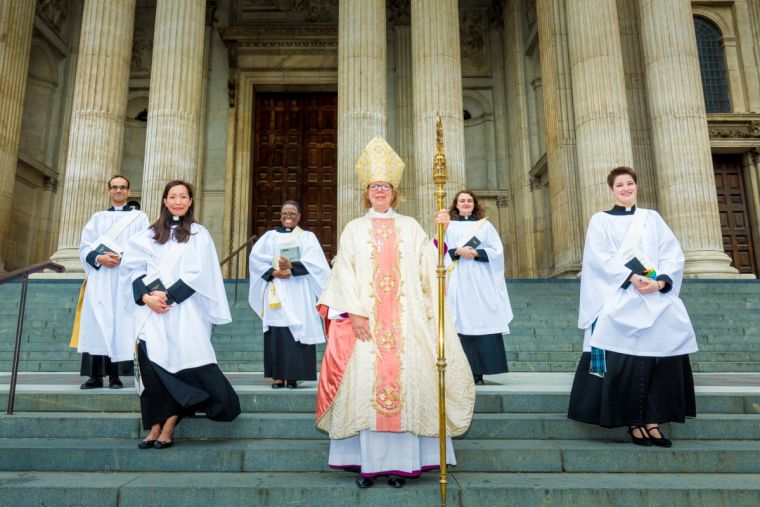The Bishop of London on how Christians can stay anchored in the chaos of Covid-19

Lent is generally a time for reflection and after the events of the past year, Covid-19 is likely to be on the minds of many Christians.
The Bishop of London, Dame Sarah Mullally, has released a new book called Rooted in Love to help Christians make the most of this season to grow deeper in their relationship with God and recharge their spirtual batteries so they can keep fighting the good fight.
She speaks to Christian Today about what keeps her going when times are tough and how Christians can use the difficult seasons in life to grow.
CT: Lent is solemn by nature and this year seems even more so. What do you think we as Christians can gain from the solemn times in our faith?
Bishop Sarah: For me, Lent is always a time to reflect on our relationship with God, who God is for us and what He has done through Jesus Christ. It's a time for reflection on our humanity and our mortality, but also the generosity of God's love in Christ Jesus.
It's good to have a Lent rhythm to our lives that is about prayer but also reading and exploration, and resources can help with that - hence the offer of this book.
CT: You draw on Ephesians. What is it about book in the Bible that is particularly pertinent at this time?
Bishop Sarah: I love the exploration of who Christ is for us and the wonderful passage at the start of the book that that talks about being rooted and grounded in love because that's how we can comprehend how broad, how deep and how high the love of Jesus is.
There's never been such a time when we needed to know that - in the midst of a pandemic - that God's faithfulness remains for us and that we can take our eyes off the storm and look to God. This book provides an opportunity to increase our rootedness in the love of God in Christ Jesus.
CT: At this time of life, it could be tempting to hide under the duvet. But your book almost seems to be saying the opposite, that this is the time when Christians need to be digging in, reaching out and serving their communities even more.
Bishop Sarah: It was in such a time when the world looked pretty bleak that God stepped into it in Christ Jesus. There is that wonderful passage in John that talks about the light shining in the darkness and the darkness not being able to overcome it. At these difficult times, that's when we need to remember who God is for us and that God doesn't change for us.

When we find a greater sense of belonging and abiding in God and his love, then it is through that that we are then able to shine as lights and show that love to the world. At this very difficult time, people need to see hope and light, and feel loved.
CT: You write in the introduction about 'coping with chaos'. How have you stayed anchored through all of this?
Bishop Sarah: It would be a very unusual person who says that the last year hasn't been very difficult. And I think it's important for bishops to talk about that - that it has been difficult. But the image I use is the image of Jesus in the midst of the storm with the disciples. They were out on the lake when the waves picked up and they were afraid. Jesus calms the storm and says, "Do not fear, it is I." Jesus isn't saying do not be afraid because the storm isn't there. The storm is real and it's a threat to their lives. But it's the bit that comes next - "It is I" - that is the key.
The challenge for us is to take our eyes off the storm and focus on Jesus Christ. So for me, my faith, my belief in Jesus Christ and the hope we have in him is the anchor for my soul. The important thing for me in the midst of this storm has been to spend time developing my relationship with God and finding my rhythm of prayer and Bible study, because it's that which holds me in the midst of this moment.
Of course we're afraid. If we weren't afraid we wouldn't wear our masks! We wear our masks because we're afraid and want to protect others. But we always can know as Christians that God does not change, He is our anchor and the One we should focus on in the storm.
CT: You touch on these questions of 'why?' and 'how long?'. What do you think can sustain Christians in their faith and help them to keep going, especially when the hardships are long-term and don't just blow over?
Bishop Sarah: I think it goes back to establishing that rhythm and routine to our relationship with God, whether it's reading a Bible study or morning prayer. Because if you have a routine in those moments when it gets tough and you think 'oh gosh, can I keep going?', the rhythm keeps you going. The book 'Rooted in Love' is trying to offer people a routine through Lent with a reflection, a reading, an action point and a prayer that will help people no matter how they are feeling in this moment. I am a great believer that it is this that sustains us because the Spirit can pick us up again and we can catch that glimpse of God. This book can help us do that.
CT: Something we keep hearing from Christians is realising how important and meaningful it is to meet together in person as Christians. You write in your introduction that Christians are called to continue living together in the hope of the Gospel. What does that look like in a Covid and post-Covid world where we might not be able to meet in person?
Bishop Sarah: We've learned a lot about the importance of connectivity with people. I too miss being in church with people and singing together, and I realise how important it is. But we've learned how community can still continue and I've been privileged to have joined in with worship online, Bible study online, groups that meet for coffee online and so on, and so we have begun to find ways to sustain community when we can't meet in person.
And I've seen communities grow with people who maybe would never have gone to a physical church joining in for the first time. Or likewise, people who would never have shared a Bible reading or testimony in front of people in a church building having done it online.
So there are some things we have learned about what it is to be in community but not necessary physically able to meet. The challenge for us is to say: what does that teach us about ourselves and God as we go forward?











